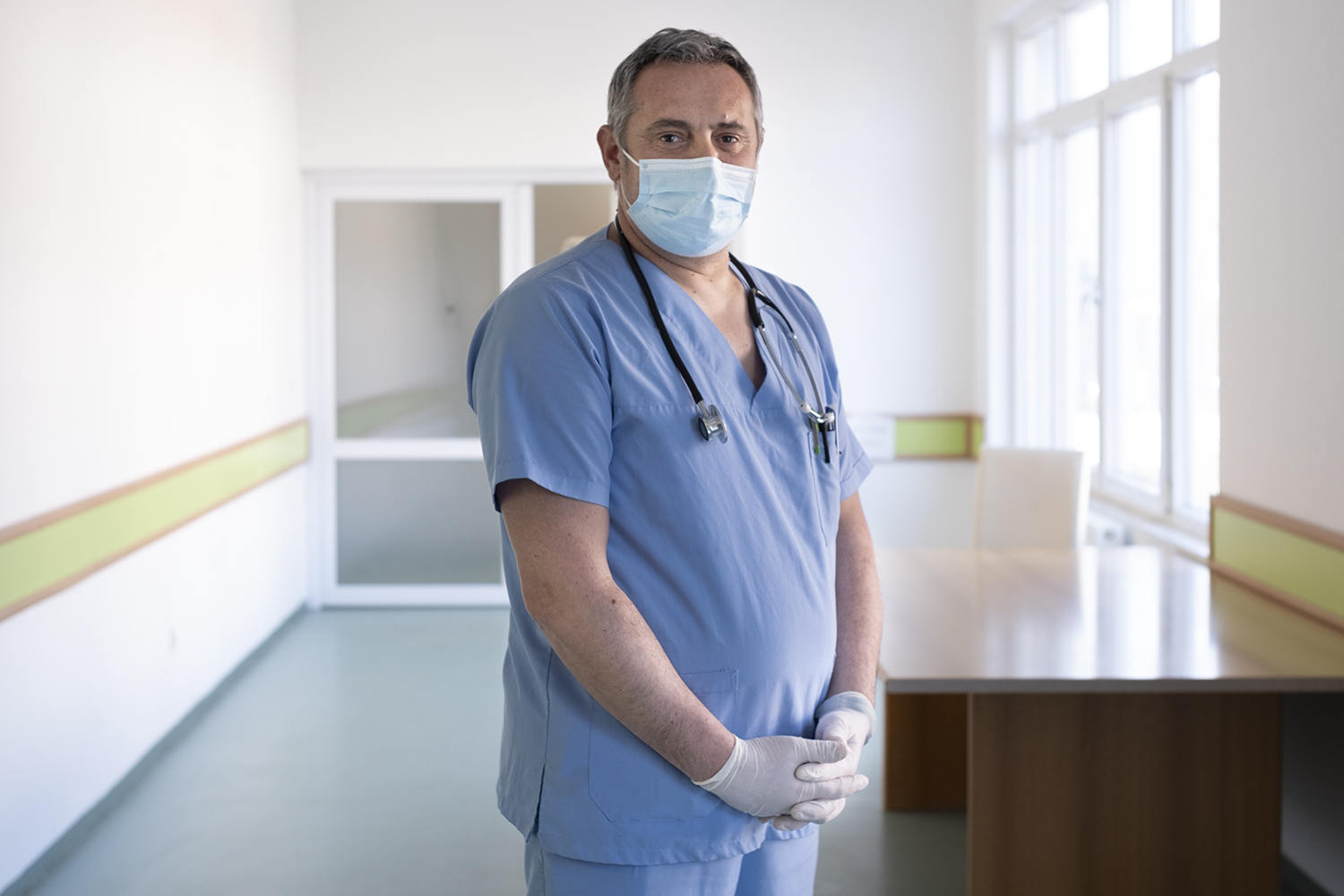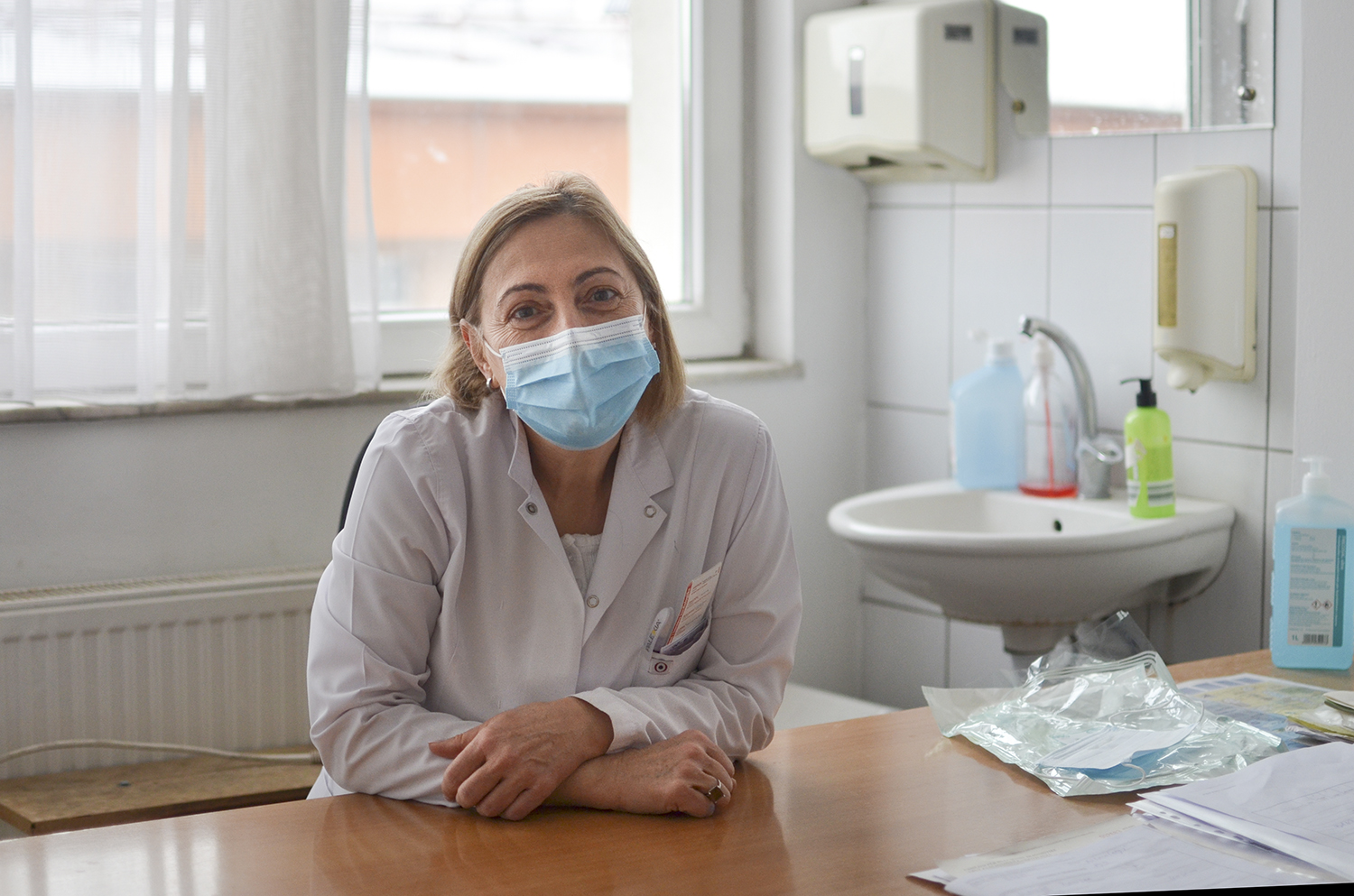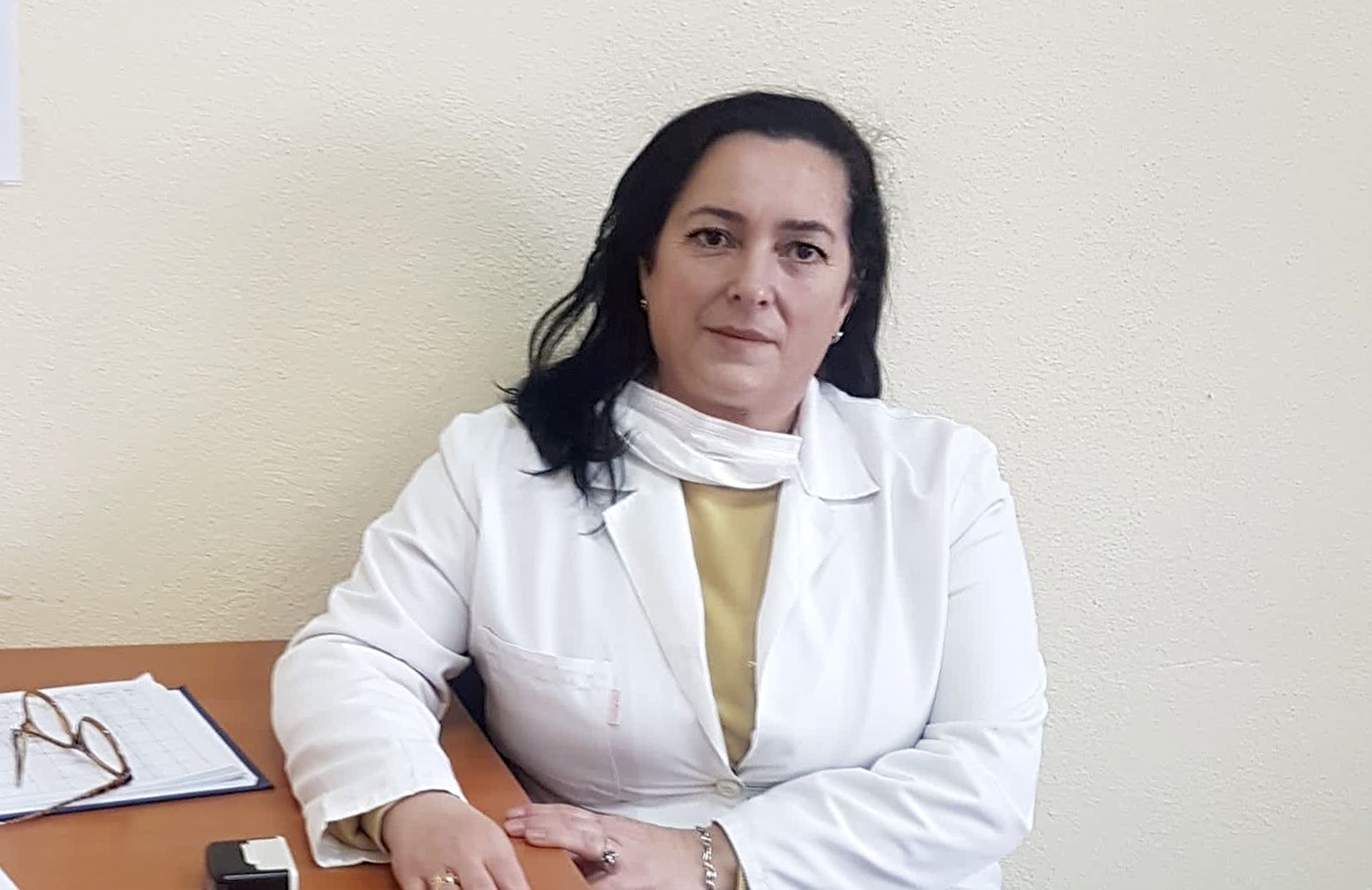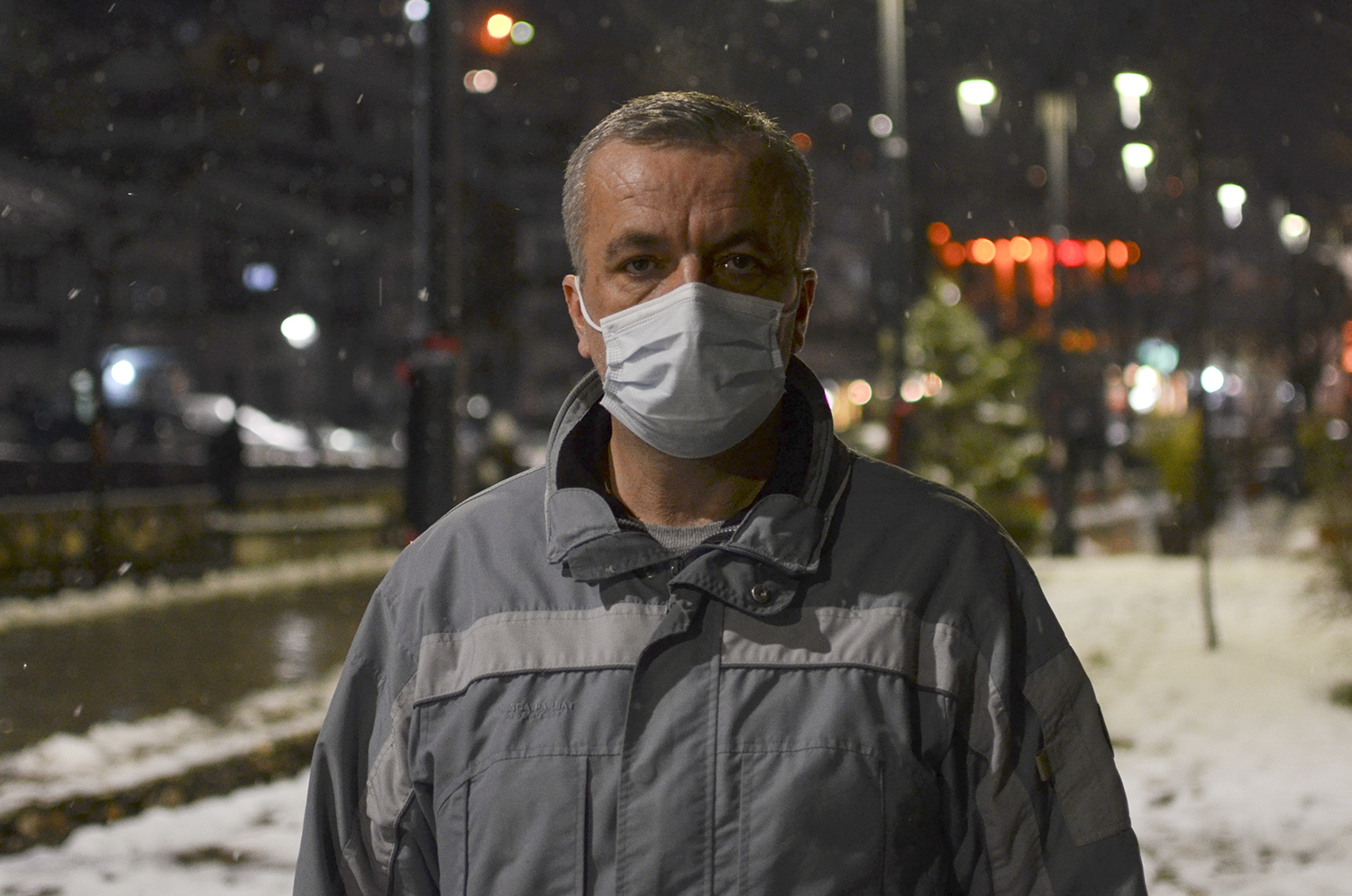On Friday, March 13, 2020, a virus that initially seemed distant and sounded obscure made its way to Kosovo. Today, on the anniversary of the first confirmed COVID-19 case in Kosovo, over 1,600 people have died as a result of infection, while the number of active cases exceeds 10,000.
In their unceasing fight against the virus, health workers have perhaps experienced the most change in their day-to-day lives, be it at home or at the workplace, adding to the already numerous challenges within the healthcare system. Furthermore, they have felt first-hand the consequences of negligence towards their needs by relevant institutions and the shortcomings of pandemic management.
Over the course of the pandemic year, we have reported on the experiences of the most vulnerable among us: the elderly, patients, and health workers who were in the frontline during the deadliest waves of the virus, as well as the marginalized groups that suffered further oppression as a result of the pandemic: women, Roma, Ashkali, Egyptians, LGBTQ+ people, workers without employment contracts and legal protection.
Now one year later, in an attempt to learn more about how healthcare workers have dealt with the pandemic, we spoke with six of them who live in various municipalities and practice their profession there.
Saga e vaksinave
Derisa punonjësit shëndetësorë nëpër spitale po përpiqen deri në fund, në politikë ka ngecje kur bëhet fjalë për atë që do t'ua lehtësonte atyre përpjekjet — sigurimi i vaksinave.
Në janar 2021, kryeministri i Kosovës Avdullah Hoti pati thënë: "Janë konkretizuar bisedat me [kompaninë farmaceutike] Pfizer për 535,000 vaksina, janë konkretizuar bisedat me Austrinë për 600,000 vaksina dhe me [iniciativën globale] Covax janë kryer të gjitha procedurat e aplikimit për 720,000 vaksina — presim që vaksinat e para të vijnë në shkurt".
Në mars, Kosova mbetet një ndër shtetet e fundit në Evropë ku ende s'ka arritur as edhe një dozë e vetme vaksine.
Between hope, exhaustion and incessant work, we asked healthcare workers how they experienced changes in their workplaces as a result of the pandemic; what additional burdens they had to carry; what differences they felt in their relationships with co-workers and patients, and the toll all of this took on their personal lives.
And apart from this, we asked them about how they see the future as we’re entering the second year of the pandemic; what they expect from this year and how aspects of their personal lives relate to their professional lives; what worries they have regarding their work and whether they see any solutions to the inherent problems of the system in which they work.
The people we spoke to include professionals who have decades of working experience who have served during a crisis different from the one we’re in, as well as young trainees who carry a responsibility of such degree on their shoulders for the first time. They recount their experiences from last year along with personal anecdotes that sharply illustrate some of their daily dilemmas and difficulties.
Dr. Leonard Muja, pulmonologist, Mitrovica
When COVID-19 came to Kosovo
It was the 13th day of the month, a jinx. When the first case was confirmed on the 13th, it not only caused panic within society but also to healthcare institutions, including myself personally, because we were dealing with something we hadn’t encountered before.
The first case in Kosovo was a true bomb for the healthcare community, if I may say so. It was possibly one of the most difficult challenges, not only for me as a pulmonologist but for all medical specialties because it was unclear what healthcare workers would be assigned to. Who would do what?
Getting used to the new routine
I somehow mentally prepared myself that a viral storm was approaching and, in a way, all health professionals banded together. We had a lot of work in the first few months, and the first signs of panic started presenting themselves systematically: “Doctor, can you explain to us what this illness is?” “How will it subside? “Will we…?”
In a way, we were also forced to become health psychologists, not only pulmonologists or health professionals of internal diseases or respiratory diseases or infectious ones. We had an obligation to play these roles, too.

Pulmonologist Leonard Muja says that he has had days so busy that he could not go home to his children and wife at all. Photo: Atdhe Mulla / K2.0.
Personal experiences
[When I suspected that I might have the virus], I tried to convince my children that they were visiting their uncles because I was at work and had additional tasks, so “daddy can’t come very often.” But interestingly, my son and daughter always knew: “Dad, we know that you are curing patients with the virus, and you are taking us to our uncles so that you don’t infect us.”
I tried to make it seem to them like changing weather — one day it is good, and the next day it is poor, but there will always be sunshine after the rain. I tried to explain to them what the illness is, how the virus is, whether it affects people, what ages it affects [more severely]. I tried to prepare them [so they could protect themselves] because the virus would not spare them just because I love them a lot.
When I, myself, got infected, my kids would constantly ask me: “Dad, should I measure your [oxygen] saturation?” and “It’s quite low; what should we do?”. I would always tell them: “Daddy will get better, but things do not pass immediately. They’ll improve slowly.”
I did not tell my parents at all until I was admitted to the hospital. I tried [to keep my distance and not worry them with updates] because mom and dad have underlying conditions. I would always insist that if they had any contact with me, I would be the main culprit [if] they died [because of the virus]. I didn’t see my parents for a month. When I finally saw them, I felt a sort of joy that made me feel like I was born again.
Patient care
We felt the deaths of our patients in our souls because we, too, are humans made of flesh and blood. So, I was often hit hard, but I did not let their family members see my tears.
It often happened that the wife was being treated in one ward and the husband in another, with both of them passing away just hours between each other. Or one would survive, whereas the other would die. And then we had to deal with the feeling of how we should tell them after they were released, what happened to their wife or husband, did they survive, are they at home, can I see them, in which ward are they. But it also happened that both would go home with the joy and relief that they survived, and we would tell them: “Look, you both beat the virus.”
"Life has to go on, with or without the virus."
Leonard Muja, pulmonologist
We always [do as much as we can so] that every patient who is released will not have to be on oxygen therapy all the time, that they don’t make friends with the [oxygen] canister. There were cases when patients spent months at the hospital on oxygen therapy, and after returning home, we saw on social media that they were going back to work, and we would say: “Look, he’s going back to work now,” and that makes us proud.
The future
The degree to which we’ll be able to eliminate another wave of the virus remains to be seen, but I know one thing for sure: Kosovo is far from vaccination.
The only hope is that the virus drama will end as soon as possible. One day, as soon as that may be. Besides the hope that people will become aware that we will have to coexist with this virus for a long time, I also hope that the general population will get vaccinated and have their antibodies. But life has to go on, with or without the virus.
Gresa Geci – nurse, Mitrovica
When COVID-19 came to Kosovo
Everything that was once part of my routine at the hospital changed. As soon as the pandemic started, we started dealing with more and more urgent cases and not with the outpatient cases we dealt with before the pandemic, so my routine at the hospital changed completely.
When the virus appeared, we were unable [to continue working] solely with the cases we were used to having at our ward. Instead, we were forced to move from one ward to another every two weeks because we needed to work as assisting staff due to the hospital’s lack of personnel.
Getting used to the new routine
Initially, it was a bit difficult when we got COVID-19 patients that had to be intubated because we had not been trained for these cases before, and I did not have experience with intubation. Then it was also hard to deal with cases that needed oxygen and other similar cases.
One Saturday, I worked for 12 hours straight. We had a patient hooked up on a CIPAP machine [that aids breathing in patients with heavily damaged lungs], which you cannot take away from the patient for even a moment. I was simultaneously taking care of 10 other patients while having to stay near the patient in question all the time because of his breathing difficulties.
Personal experiences
I was assigned to the COVID-19 ward in December, and now we’re in March. My family has constantly told me to be careful, and they have frequently asked me why I accepted being assigned here.
"It is difficult for one nurse to take care of 10 patients with COVID-19 at the same time; it is very exhausting."
Gresa Geci, nurse
I’m afraid to have any contact with my family when I get home, so as soon as I come back from work, I put my clothes in the washing machine and jump in the shower; only then do I get close to my family members. I am constantly afraid that I might be unknowingly transmitting it to others, and that’s why I have been keeping contact at a minimum.
I have been affected mentally, and I am tired. One day when I was emotionally wrecked was when one of the patients passed away. I felt incredible regret when we had to inform the family members who were waiting outside of their loved one’s death, and when I got back home, I couldn’t stop thinking about it. This happened because it was the first time I saw a patient die in the four years I had worked at the hospital.
Patient care
Whilst I commit myself to my patients in normal circumstances, this dedication has now increased many times. However, it is difficult for one nurse to take care of 10 patients with COVID-19 at the same time; it is very exhausting. If there were two of us, it would have been much easier.
If our hospital fulfilled all of our needs, or, for example, we could treat cases that we have to send to Prishtina here in Mitrovica, the situation would be much easier. Having additional staff, the necessary medication, and sophisticated tools would make our work easier and more manageable.
The future
I believe that the healthcare personnel will not have to wear additional protective equipment after vaccination, but I think that one long-term change will be mask-wearing and changes in social behavior — like physical distancing — which will stay with us for a bit longer. Being more attentive about hygiene should be required all the time as well as not hanging out in spaces where there are a large number of people.
Something else that will stay with me after the pandemic is taking extra care of my patients.
Dr. Sevim Brina – pulmonologist, Prizren
When COVID-19 came to Kosovo
[In the beginning of the pandemic], there were no changes to my working hours, but the intensity of my work increased. We always scrambled to find time for ourselves or even to eat. When we had a lot of work, we would eat standing.
Before the pandemic, we had at most twenty patients between the time we started and ended our shifts. This number has now multiplied. How, then, can you find any time for a break in this routine? You can’t!
"I haven’t had a single day of vacation since the beginning of 2020."
Sevim Brina, pulmonologist
People are adaptable, but I’m on my feet for 24 hours, and I am exhausted. Patients die every day — we are mentally drained. “What has gotten into you?” my brother asks me every day. I tell him that I am suffering the effects of COVID-19.
Getting used to the new routine
I’m a health worker; I do not go anywhere. We know that we should stay far from places that many people frequent. We cannot get permission from work and cannot take leave; I haven’t had a single day of vacation since the beginning of 2020.
I don’t have the time to follow scientific developments around the world. For example, I cannot sit down and read about what’s happening in Germany. We cannot quench our interest in science because we work like physical laborers. We never stop.
Personal experiences
This pandemic has had a significant psychological effect on me: I can’t stand noises anymore; I do not want to watch TV. I seriously don’t want to sit down and talk to anybody; these activities feel very dreary to me now.
I have never done these things in the past — I do not want to be part of crowds; I don’t want to talk to people. Most people around me are health workers, and we have the same conversation with all of them. I have become antisocial.
From a psychological point of view, this behavior is not normal. After the pandemic is over, we need support from therapists. I will find a good therapist and visit them.

According to Sevim Brina, Kosovo should have a separate hospital for COVID-19 patients. Photo: Suer Celina / K2.0.
Patient care
Globally, there are separate hospitals for COVID-19 patients, but we were unable to have one even a year later. I could treat COVID-19 patients [in one such hospital] for as long as necessary, and then I would go back and deal with my other patients.
We don’t know where our patients with cancer or tuberculosis are; there is a lack of labor organization. Sometimes I feel sorry for myself for having chosen this profession.
The future
If we follow the rules, the situation will be much more manageable. Unfortunately, the physical distancing requirement is not followed at all. The more aware our people are, the easier our burden will be. But I think they will change; people will start following the rules and be careful. You might have noticed that people do not shake hands anymore when they meet. Instead, they bump their fists instead. This practice is a very good thing. Why shouldn’t it remain this way?
Dr. Qefsere Luzha Mehmeti – dentist, Mitrovica
When COVID-19 came to Kosovo
In the beginning, it caused me a lot of stress because we were dealing with an unknown illness and a virus that is potentially deadly.
First, you are forced to think about yourself and also about the patient lying in front of you. Obviously, as a dentist you have to deal with the area from where the infection spreads — the mouth, throat, and nose — because you are in very close contact with the patient, not even 30 centimeters away.
Sometimes we have to get even closer, especially when teeth have to be extracted, meaning that infection is even closer. If teeth have to be drained, the machine can spray around water, and the droplets can get in your eyes, face, and everywhere else.
We have been obligated to wear masks and visors, which are quite difficult to keep on, [especially around summer] when temperatures started rising.

Dentist Qefsere Luzha Mehmeti is under constant pressure from taking care not to spread the virus. Photo: Urall Boshnjaku / K2.0.
Personal experiences
I was completely blocked and cut off contact with my wider circle and relatives, but of course my family had nowhere to go, and I had to return home to them. However, I would always wash myself fully before having any contact with them. I wouldn’t even hug my children when I came back home, which I usually did before the pandemic.
The fact that the virus was and still is around is a mental burden to me. However, over time I have gotten used to the fact that we need to deal with the virus, and I have calmed myself down by believing that if I follow the rules regarding hygiene and distance, and if I keep my mask on, everything will be fine.
The future
I believe that mask-wearing will be one of the changes that we will have to adapt to for a longer period until at least 70% of the population is vaccinated. At the same time, our relationship with other people, surrounding proximity to others, will go back to normal, as this has started already.
A faster arrival of the vaccine would make our job much easier, so I hope that vaccines will come in as soon as possible.
Mahir Krasniç – nurse, Prizren
Personal experiences
I think that the situation gets worse when every talking head on TV speaks about COVID-19. What we see on the news has a negative effect, and it can induce fear. Psychologists need to offer free-of-charge support to the public.
"We try to do our best, but unfortunately sometimes we do not get the results we expect."
Mahir Krasniç, nurse
My spouse is also a co-worker, so we cannot go anywhere. Although we are very careful, we are still afraid of going out to meet somebody. We make sure not to go out that often and instead we do things within the family, like watching a motivational movie. We try to use good weather to our benefit, going outside of town where there are no large groups of people.
Patient care
When a patient is ill with COVID-19, their rehabilitation will take a long time. They need psychological, physical, and medical rehabilitation. We do take care of our patients, but sadly some of them pass away. It is not how people see it from outside, “the patient died and that’s it” — we are, of course, affected by these cases.
A proverb you can hear in Prizren goes: “You cannot leave your skin.” We try to do our best, but sometimes we do not get the results we expect.
The future
When people start getting vaccinated one by one — the elderly and those with weak immune systems first — the rate of transmission will drop. Groups with a high-risk of contracting the virus also need to be vaccinated, specifically health workers, police officers, and military personnel. If one person in these groups gets infected with the virus, it can spread very fast.

Nurse Mahir Krasniç believes that the situation will become easier after high risk groups are vaccinated. Photo: Suer Celina / K2.0.
Dr. Lum Muhaxhiri – emergency medicine specialist, Gjakova
When COVID-19 came to Kosovo
In the beginning it was like a state of war, the enemy being microscopic instead of human — we were dealing with a scarier war because we couldn’t see the enemy. You only know it exists and that it is attacking you. This was rather scary and unpleasant at the same time, there was a sort of bleakness.
Considering that it was a novel issue, it was really difficult because we knew little about it. We didn’t know about the treatment, about its progression, and there were many question marks.
Getting used to the new routine
[Maybe also because] I am a new doctor; I was very motivated to work regardless of the influx of [patients] — I had a sort of enthusiasm I can’t quite explain. Thankfully I was full of energy and didn’t spare myself at all. I sometimes started working at 8 in the morning and didn’t come back until 9, 10, or even 11 at night, yet I did not feel that tired. I felt very enthusiastic about working, knowing that the people truly needed treatment and care.
[The pandemic] has disrupted my routine of going out for coffee or walks. I was sort of isolated, but I thankfully made it — I made it somehow. Luckily, I also make a little bit of music – I play the piano – and this served as a kind of consolation that helped me overcome stressful situations.
Personal experiences
It was a bit difficult because we were very afraid in the beginning. Not only us health workers, but this pronounced fear affected the general populace, too. And it was difficult being part of the healthcare system at work – i.e., the hospital – where you’re in continuous contact with COVID-19.
"The aim of a doctor’s profession is to serve the people, so we will always be at their service."
Lum Muhaxhiri, emergency medicine specialist
That means you would have direct contact and then go home to your family, which poses a significant risk for them. I tried to always keep my distance, and even though I did get infected, I isolated myself in my room, and my family members have so far thankfully not gotten COVID-19.
Patient care
The aim of a doctor’s profession is to serve the people, so irrespective of the situation, be it good or bad, we will always be at their service. And the primary thing is that the people get adequate treatment and that we have adequate access to the people. This is important — when we give our service from the aspect of health, this means everything. Other things come next.
The purpose of the medical profession is to serve the people, so no matter what the situation, for better or worse, we will always be at their service. The primary thing is that the public get the right treatment and we have the right approach to the public. When it comes to health care, that’s important. Other things are secondary.
The future
Luckily, with vaccines being manufactured, this pandemic will also be brought under control. It will be more under control than it was before the vaccine and workflow will eventually go back to normal. It’s only a matter of time until people will have access to the vaccine, [and afterwards, things will start] to improve significantly.K
Feature image: Atdhe Mulla / K2.0.





